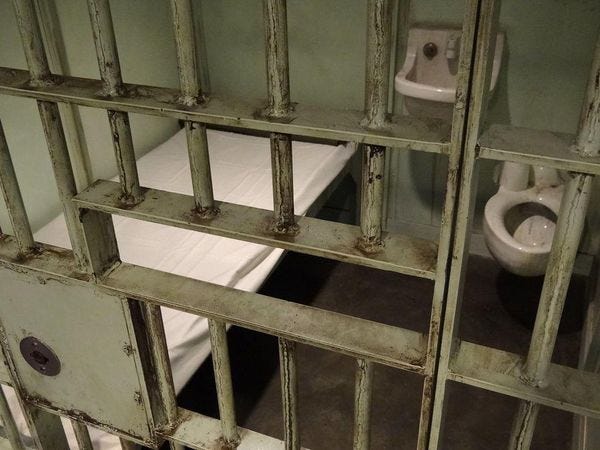Illinois Temporarily Banned From Banning Cash Bail
A Kankakee judge has ruled it unconstitutional.
On any given day in the United States, there are about 470,000 people incarcerated in our system who have not been convicted of any crime — a 470% increase since the 1970s, when the crime rate was five times higher than what it is now. The average length of pretrial detention is three weeks, but many low-income people are locked up for actual years simply because they can't afford the bail required to get out. Jail is dangerous, and any time spent in one is likely to cause financial devastation due to the loss of a job and, frankly, some pretty serious psychological (and possibly physical) trauma. This is one of the reasons why jails have more than twice as many suicides as prisons.
For the last several years, civil liberties advocates across the country have been fighting for reform of the cash bail system in hopes of changing some of this.
Illinois was all set to become the first state to eliminate cash bail entirely on the first of this year, thanks to the passage of the SAFE-T act last year. Cash bail, of course, is a ridiculous, classist and outdated system that doesn't actually do anything to ensure anyone's safety. The law would still allow the state to hold those considered a serious violent threat or flight risk in pretrial detention.
Unfortunately, Circuit Judge Thomas Cunnington of Kankakee, Illinois ruled last week that portions of the SAFE-T act violate the state constitution.
NBC 5 Chicago reports:
Cunnington's ruling held that the pretrial release provisions in the SAFE-T Act violated the Separation of Powers Clause, the Victim Rights Act, and unconstitutionally amended Article I, Section 9 of Illinois' constitution, which codified cash bail in the state.
Cunnington was swayed by the plaintiffs' argument that the state constitution provides for bail in stating, “All persons shall be bailable by sufficient sureties,” while Illinois Attorney General Kwame Raoul's staff contended that the statement merely assures defendants that there's a way out pending trial.
The state appealed that decision.
The Illinois Victim Rights Act (frequently referred to as "Marsy's Law" in some states) is not as bad as it is in some other states. It doesn't have the provision that allows alleged victims to withhold evidence or refuse depositions from the defense. Rather, they have "'[t]he right to notice and to a hearing before a court ruling on a request for access to any of the victim's records, information, or communications which are privileged or confidential by law."
It does, however, like other versions of the law, presume the defendant's guilt prior to conviction. One of the ways it does so is with the provision giving the alleged victim "right to have the safety of the victim and the victim's family considered in denying or fixing the amount of bail." This is understandable from a human perspective, but less so from an "innocent until proven guilty" standpoint.
People like to think that cash bail is a good system because it protects the public from a potentially dangerous criminal while we wait to convict them and ensures they will actually show up to their trial. However, more than 95 percent of crime committed in the US is nonviolent , which suggests that we would all be just as safe with most of these people at their homes as we would be with them in county jail. It also allows those who could actually be a threat to their communities get out of jail because they happen to have money.
Putting people in jail, as mentioned, causes more problems than it solves.
More than 63 percent of people in these jails have mental health issues, for which they rarely get treated behind bars. I don't know that I can properly describe the frustration and tears involved in spending hours trying to get someone in jail their medication but I am pretty damn sure that not everyone in jail has someone who will do that for them.
Then there are the health problems. People in jail are not given proper food or water and are more likely to be exposed to infectious diseases than they are on the outside.
Putting someone in jail more or less guarantees that they will lose their job, unless they have some incredibly understanding employers. It seems fairly obvious to say that those who can't afford cash bail are not independently wealthy and therefore really cannot afford to lose their job.
Studies have also found that because of the effect on employment, pretrial detention actually makes us less safe, because — duh — people who can't find employment are more likely to commit crimes in order to survive.
While the ruling was initially meant to only affect those counties whose district attorneys filed the lawsuit against the legislation, the state Supreme Court has decided to put the provision eliminating cash bail on hold for the entire state until they rule on it.
Illinois currently holds 267,421 people a year in pretrial detention. That's a lot of lives to ruin before anyone is found guilty. Hopefully the Illinois state Supreme court will come to the right decision here.
Do your Amazon shopping through this link, because reasons .
Wonkette is independent and fully funded by readers like you. Click below to tip us!




Putting someone in jail more or less guarantees that they will lose their job
Are there no prisons bootstraps?
It is absolutely going to happen again